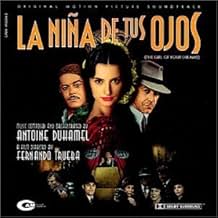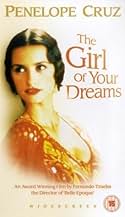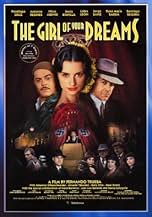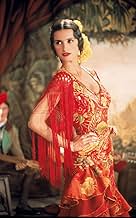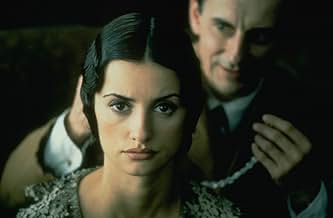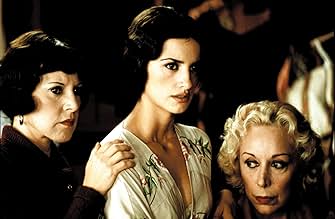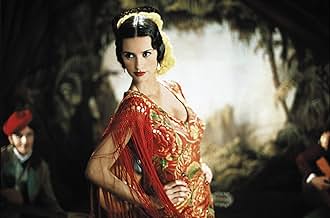CALIFICACIÓN DE IMDb
6.7/10
4.6 k
TU CALIFICACIÓN
Agrega una trama en tu idiomaA company of Spanish movie makers leaves Franco's Spain and moves to Hitler's Germany to produce a film. Problems soon arise.A company of Spanish movie makers leaves Franco's Spain and moves to Hitler's Germany to produce a film. Problems soon arise.A company of Spanish movie makers leaves Franco's Spain and moves to Hitler's Germany to produce a film. Problems soon arise.
- Dirección
- Guionistas
- Elenco
- Premios
- 14 premios ganados y 16 nominaciones en total
Rosa Maria Sardà
- Rosa Rosales
- (as Rosa María Sardá)
Miroslav Táborský
- Václav
- (as Mirosláv Táborský)
Juan Luis Galiardo
- Embajador
- (as Juan Luís Galiardo)
Jan Preucil
- Maisch
- (as Jan Přeučil)
Borivoj Navrátil
- Henkel
- (as Bořivoj Navrátil)
Opiniones destacadas
The cast is excellent and the movie is quite funny and moving. Not to mention based on historical facts. (Spanish actors doing movies at the UFA studios in the thirties). The setting, the costumes and photo -brilliant. However there's one big draw back: The plot goes "Thummpph!" after an hour and suddenly becomes a French farse (people banging doors, hiding in closets and becoming hysterical) and it all falls apart. It does pick up at the end though. It's not the greatest film ever made but it's watchable. And Penelope Cruz...what can I say? She's fabulous.
With a wonderful cast, including the divine Penélope Cruz, this movie is the best Spanish movie of 1998. As a humorous approach to Spanish actors working in Hitler´s Germany, it provides the spectator with large quantities of laughs, as well as with very touching scenes.
I have just got this film on DVD I saw it a couple of years ago during a Penelope Cruz season in Manchester, I enjoyed it then & I enjoyed it just as much now.
As a non-Spanish speaker I still got the comic elements & the historical references to a point & now I have it on DVD I can go back & check any bits I have missed.
I just like the characters in this film, the fish out of water element of the Spanish in Nazi Germany is very funny the off the cuff one liners are priceless.
Cruz & Resinas may be the focus of the film & they are lead the way but everyone gets a moment to shine in this film, segura is my favourite he always steals some or all the limelight in any film he appears.
I would heartily recommend this film it may not be up to Belle Epoque but its not far behind.
As a non-Spanish speaker I still got the comic elements & the historical references to a point & now I have it on DVD I can go back & check any bits I have missed.
I just like the characters in this film, the fish out of water element of the Spanish in Nazi Germany is very funny the off the cuff one liners are priceless.
Cruz & Resinas may be the focus of the film & they are lead the way but everyone gets a moment to shine in this film, segura is my favourite he always steals some or all the limelight in any film he appears.
I would heartily recommend this film it may not be up to Belle Epoque but its not far behind.
One may wonder if "La niña de tus ojos" really deserves all the nominations and awards it got. It is not "Belle époque" and there are some obvious clichés but it's still a very enjoyable film. The colours are vibrant and the black humour is piquant though not everyone (especially the English-speaking audience, and Asian audiences not exposed to this sort of humour) may appreciate it. Of course, the fabulous Penelope Cruz will make one overlook whatever faults there are in the film. As usual, she's brilliant. The interplay of dialogue in Spanish, German and Russian is hilarious. Liked it very much.
Without trying to offend anybody I have to agree with another reviewer in that an explanation for the bad reception of this film among the non-Spanish speakers reviewers was exactly that: Spanish is not their first language and this is sometimes, as another reviewer has pointed out, a difficult film to understand if you are not a native speaker. A full understanding of the dialogue would help to clarify some of the bizarre scenes in the film. It might not be the best script written by Rafael Azcona, without any doubt one of the best scriptwriters in the history of Spanish cinema, but at times it is hilarious. A better grasp of Spanish history and culture would also come quite handy. So what else can you say about Penelope Cruz in the scene where she dances and sings for Goebbels?. As one her shoe is missing, she unintentionally imitates Goebbles, as she approaches him in a frontal shot, who is lame.
Jokes on the Spanish fascist are more than just clichés. For example the cuckold Spanish ambassador played by Juan Luis Galiardo and his nymphomaniac wife, played by Maria Barranco. And the wisecracking remark made by the pro-fascist Spanish troupe leading man, Jorge Sanz, wooded by his German counterpart "Yo doy todo por mi patria menos mi culo", he would give anything for his country except his ass. They are both an amusing pisstaking on fascist patriotic macho culture. This subject of patriotism being a hot issue right now in Spain where the right-wing government of Aznar is endorsing the notion of "Patriotismo Constitucional" or Constitutional Patriotism developed by the German philosopher Jürgen Habermas. Unashamedly, the film upholds the necessity to produce espanoladas. As the film director Blas Fontiveros, played by Antonio Resines, remarks that the life of a Spanish hero has more relevance to Spanish audiences, as they feel more identified, than for example Al Capone's. 5 Spanish (espanoladas) films were, in fact, made in Nazi Germany. Two starred by Imperio Argentina and another 2 by Estrellita Castro both stars of the "cine folclorico espanol".
As already remarked by some reviewers the film copies scenes from other films, the most obvious being its final sequence, which is a rip off of the end of Casablanca, but to suggest that it is a carbon copy of such and such a film is pure overstatement and a rather facile critique of the film. Yet its politics are not at all convincing, not to say rather naïve. The introduction of the Russian Jewish character signals the fall of the film into sentimental humanism and vacuous romantic trifle from where the film does not recover. Nevertheless La Nina de tus Ojos has its charms too and I found it extremely funny. The cast is excellent (Penelope Cruz playing an andalusian, a role she had already done in Almodovar's "Todo Sobre mi Madre" as a prostitute). Resines and Sanz are a surprise as well as Santiago Segura. But special mention deserves Miroslav Táborský, playing Vaclav the interpreter. Subtle looks at Macarena tell of his unrequited love for her. His increasing fascination with Macarena moves him away from his non-interventionist stand to resignedly accept his fate by the end of the film, along with Fontiveros who is Macarena's lover, at the hands of the Nazi. Yet this is never overdone as the change of views underwent by the other characters towards the Nazi regime, in particular the case of Julian Torralba. This little subplot of the film is quite moving rather sentimental and its quiet essence contrast sharply with the bombardment of dialogue coming from the rest of the cast.
Jokes on the Spanish fascist are more than just clichés. For example the cuckold Spanish ambassador played by Juan Luis Galiardo and his nymphomaniac wife, played by Maria Barranco. And the wisecracking remark made by the pro-fascist Spanish troupe leading man, Jorge Sanz, wooded by his German counterpart "Yo doy todo por mi patria menos mi culo", he would give anything for his country except his ass. They are both an amusing pisstaking on fascist patriotic macho culture. This subject of patriotism being a hot issue right now in Spain where the right-wing government of Aznar is endorsing the notion of "Patriotismo Constitucional" or Constitutional Patriotism developed by the German philosopher Jürgen Habermas. Unashamedly, the film upholds the necessity to produce espanoladas. As the film director Blas Fontiveros, played by Antonio Resines, remarks that the life of a Spanish hero has more relevance to Spanish audiences, as they feel more identified, than for example Al Capone's. 5 Spanish (espanoladas) films were, in fact, made in Nazi Germany. Two starred by Imperio Argentina and another 2 by Estrellita Castro both stars of the "cine folclorico espanol".
As already remarked by some reviewers the film copies scenes from other films, the most obvious being its final sequence, which is a rip off of the end of Casablanca, but to suggest that it is a carbon copy of such and such a film is pure overstatement and a rather facile critique of the film. Yet its politics are not at all convincing, not to say rather naïve. The introduction of the Russian Jewish character signals the fall of the film into sentimental humanism and vacuous romantic trifle from where the film does not recover. Nevertheless La Nina de tus Ojos has its charms too and I found it extremely funny. The cast is excellent (Penelope Cruz playing an andalusian, a role she had already done in Almodovar's "Todo Sobre mi Madre" as a prostitute). Resines and Sanz are a surprise as well as Santiago Segura. But special mention deserves Miroslav Táborský, playing Vaclav the interpreter. Subtle looks at Macarena tell of his unrequited love for her. His increasing fascination with Macarena moves him away from his non-interventionist stand to resignedly accept his fate by the end of the film, along with Fontiveros who is Macarena's lover, at the hands of the Nazi. Yet this is never overdone as the change of views underwent by the other characters towards the Nazi regime, in particular the case of Julian Torralba. This little subplot of the film is quite moving rather sentimental and its quiet essence contrast sharply with the bombardment of dialogue coming from the rest of the cast.
¿Sabías que…?
- TriviaWhile fictional, the film is strongly inspired by the production of the films Carmen (la de Triana) (1938) and Andalusische Nächte (1938), two versions of the same story shot simultaneously in Berlin, one in Spanish and one in German, both starring Imperio Argentina.
- Créditos curiososThe entire credits are at the start of the film, with the end credits just recapping the main cast, with the other actors not listed alongside the character they play.
- ConexionesFeatured in Cinemania: I anodos kai i ptosi tou Nazismou (2008)
- Bandas sonorasLos piconeros
Written by Juan Mostazo and Ramón Perelló
Orchestrated by Antoine Duhamel
Performed by Arabia Martín
Selecciones populares
Inicia sesión para calificar y agrega a la lista de videos para obtener recomendaciones personalizadas
- How long is The Girl of Your Dreams?Con tecnología de Alexa
Detalles
- Fecha de lanzamiento
- País de origen
- Sitios oficiales
- Idiomas
- También se conoce como
- The Girl of Your Dreams
- Locaciones de filmación
- Productoras
- Ver más créditos de la compañía en IMDbPro
Taquilla
- Presupuesto
- EUR 4,200,000 (estimado)
Contribuir a esta página
Sugiere una edición o agrega el contenido que falta

Principales brechas de datos
By what name was La niña de tus ojos (1998) officially released in Canada in English?
Responda
